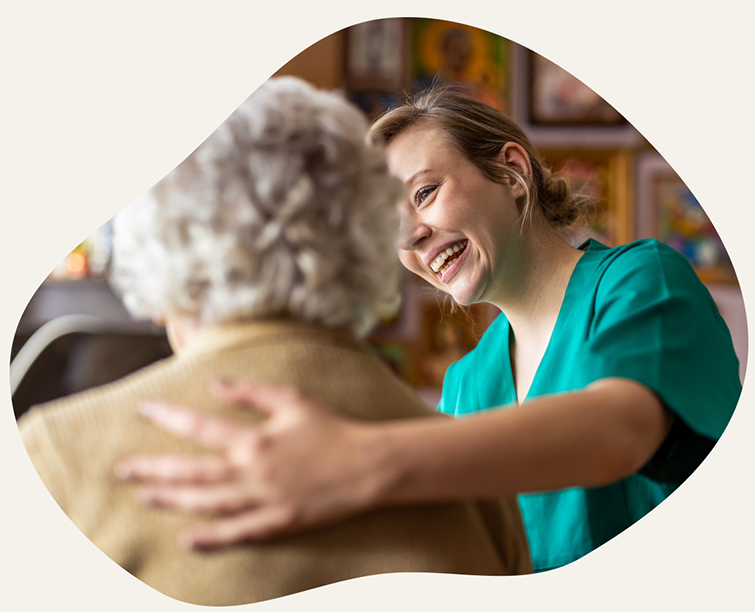In CCA’s IHSS Alzheimer’s Disease and Related Dementias (ADRD) course, IHSS caregivers learn essential caregiving skills, as well as skills that will help them identify Alzheimer’s and manage related dementia symptoms. Learn to recognize signs of Alzheimer’s and receive guidance on how to deal with related symptoms and behaviors, which can include memory loss, sundowning, hallucinations, and wandering.

To enroll in the ADRD course, specific qualifications must be met. The ADRD course is offered to IHSS providers in Northern California in select counties only, as follows:
San Francisco, San Mateo, and Santa Clara Counties
Format: Self-paced e-Learning
Duration: 6 modules, approximately 15 hours
Languages: English, Spanish, and Cantonese
Stipend: We may pay you $770 after program completion.
Northern California IHSS Provider Requirements:
- An active IHSS Provider who lives in select counties.
- The care recipient resides in select counties, is at least 50 years old, and exhibits symptoms of memory loss or cognitive decline.
If you have questions about the Northern California ADRD Course, email us at:
studentaffairs@advancecaregivers.org
Early registration for this program opens in October 2025, with classes starting in February 2026.
Sign up for this course by clicking a button below to access the enrollment form in your language:
All Other Counties
If you don’t reside in the counties listed above, but are interested in the ADRD course, please click the button below to submit an “interest form.” We may be able to expand these caregiver training courses into other counties in California if there is enough interest.
Here’s what you will learn in the ADRD course:
The ADRD training begins with some caregiving essentials, such as using proper body mechanics when moving a care consumer, proper oral care, and how to avoid unnecessary visits to the emergency room. From there, training advances to Alzheimer’s terminology, signs, symptoms, and more as outlined below.
Class 1: Roles and Responsibilities of the Caregiver
In this class, you will learn the roles and responsibilities of caregivers. In addition, you will be introduced to five enhanced roles of the caregiver on the care team – monitor, coach, communicator, navigator, and care aide; as well as four key skills that support role enhancement – observe, monitor, document, and report. Methods of identifying health plan information and appropriate documentation and reporting of consumer behavior changes will also be discussed.
Class 2: Terminology and Stats
In this class, participants will learn to recognize (though not diagnose) symptoms of Alzheimer’s disease and dementia, which differ from the signs of normal aging. They will learn what symptoms and stages they may expect to find as they care for consumers with these conditions, and they will discuss how to apply the skills of observing, monitoring, documenting, and reporting in these scenarios.
Class 3: Common Behaviors and Sundowning
In this class, you will learn about common behaviors associated with Alzheimer’s disease and related dementias. The focus will be on challenging behaviors and repetitive behaviors, such as repetitive questioning, and practicing techniques for helping consumers when they occur. You will also learn about techniques for assisting consumers with agitation and anxiety, as well as providing appropriate care. Delirium, what it is and how caregivers should respond, will also be reviewed. Finally, participants will discuss sundowning, a common symptom of Alzheimer’s disease and dementia.
Class 4: Sleep Changes and Hallucinations, Home Safety, Wandering
In this class, you will learn the principles of good sleep hygiene and how to encourage better sleep. You will learn about hallucinations, a common symptom of Alzheimer’s disease and dementia, and how to recognize the signs to help identify when the consumer is experiencing hallucinations and provide appropriate care. Caregivers are at high risk of workplace musculoskeletal injuries because of the ongoing physical support you give to the consumer, so you will learn and practice good body mechanics to avoid injury. Consumers with Alzheimer’s disease and dementia are at increased risk of falls, so fall prevention strategies will be introduced. In addition, strategies for preventing wandering, a common symptom of dementia, will be discussed.
Class 5: Assisting with Personal Hygiene
In this class, participants will review how to assist consumers with maintaining personal hygiene, such as oral and denture care, bathing, dressing, and using the toilet. They will explore special considerations for assisting a consumer with Alzheimer’s disease and dementia with these tasks and learn how to effectively address situations in which consumers refuse to engage in a personal hygiene activity.
Class 6: Nutrition and Physical Activity
In this class, you will learn the basics of nutrition, healthy and modified diets, as well as the importance of physical activity in a consumer’s daily routine. Caregivers will learn about assistive devices that can help a consumer to eat. They will also be introduced to chronic conditions linked with Alzheimer’s disease.
Related Reading: Dementia Training for Family Caregivers

